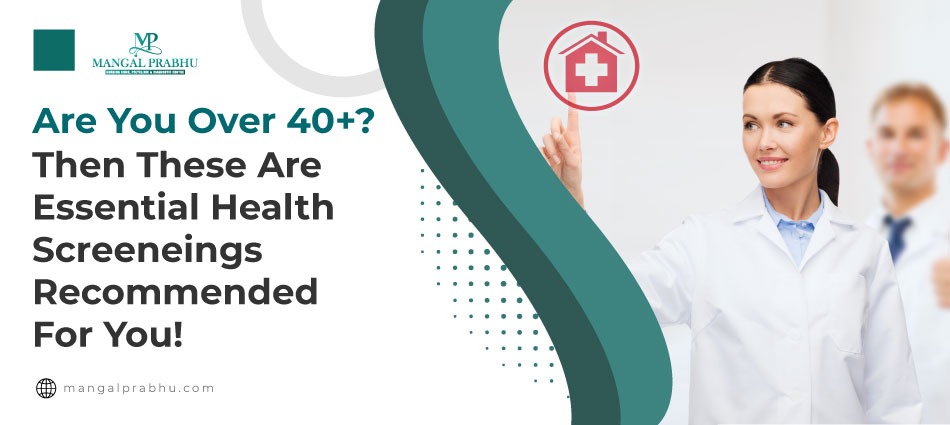
Essential Health Screening After 40
People around the age 40 have highly demanding jobs, responsibilities of elderly parents and growing children or all of the above, and therefore it’s easy to ignore health aside, though unintentionally. But 40 is the time to evaluate your overall wellbeing, and to plan for the long-run. It is considered a milestone when the risk of many health conditions increases. It could be due to lifestyle habits, negligent of health due to busy schedules and responsibilities, stress factors or hereditary. With today’s advance technology, most of the health issues are detectable and curable if treated at the right time. And the only way to stay on top of it is adopting measures such as lifestyle enhancement and regular medical check-ups and follow-ups.
Health Issues after 40.
Health screenings are generally an essential aspect of preventative health for people of all ages but as we grow older, regular check-ups for various factors must be considered as a priority. Health Care Providers in a Multispecialty Hospital in Navi Mumbai has shared the conditions they often spot in patients of this age.
- Overactive bladder.
- Perimenopausal Symptoms.
- Kidney stones.
- Urinary tract and prostate infections.
- Food allergies.
- Osteoarthritis.
- High blood pressure.
- Erectile dysfunction.
- Skin cancer.
- Depression.
- Anxiety.
Health Screenings for Men of 40.
- Prostate checks.
Prostate cancer spreads slowly, and early detection usually lead to successful treatment. The two main screening exams for prostate cancer are:
- Prostate-specific antigen (PSA test).
- Digital rectal exam (DRE).
- Colonoscopy.
Colorectal cancer (CRC) accounts for a lot of death and disease all over the world and is especially on the rise in the West. According to experts in the matter, if a polyps/tumours found on colonoscopy is small then they are easily removable, and the disease is stopped at that moment. It is highly recommended to begin CRC screening at an earlier age especially if there is a family history of CRC.
- Cholesterol Check.
Cholesterol tests should be a standard part of annual health check-ups, since cholesterol is seen as a biomarker of potential disease.
- Blood Sugar Test.
Blood sugar testing, and monitoring for good health, is highly advisable as it is one of the risk factors for metabolic syndrome. Blood sugar testing alone can alarm the health care providers that there may be a problem in the person’s health.
- Electrocardiograms (ECG).
The ECG reads the electrical impulses of the heart, and many cardiac abnormalities can be detected from these tests.
- Bone density tests.
Low bone density leading to hip fractures is a major medical problem. It is recommended that men with any of the above risk factors must consult their doctor for treatment and care.
- Dental check-ups.
Dental health is an important part of an adult’s overall health and wellness and being negligent towards it can pave the way for several other diseases.
- Eye Exams.
Eye exams can spot early signs of many chronic eye diseases, many of which do not have early symptoms.
Health Screenings for Women of 40.
1.Body mass index (BMI)/obesity screening.
Your weight and height are measured to calculate your BMI. The higher your BMI, the more chance you have of developing heart disease, high blood pressure, type 2 diabetes, certain cancers and other diseases.
2. Depression screening.
A test consisting of series of questions is administered to determine if you’re depressed or at risk for suicide.
3. Alcohol, smoking and substance misuse screening.
A test consisting of series of questions is administered to determine amounts and frequency of use.
4. Blood pressure check.
If you have history of blood pressure issues in your family, you should keep track of it by regular check. The goal is to have a blood pressure lower than 130/80 as an adult.
5. Cholesterol screening.
A cholesterol screening (also called a lipid panel) is a blood test that measures the amount of cholesterol and triglycerides in your blood.
6. Diabetes screening as part of a cardiovascular risk assessment.
It involves checking the glucose level in your blood while you are empty stomach. If your blood glucose level is too high, a retest is done to confirm a diabetes diagnosis.
7. Mammogram screening for breast cancer.
Women should begin mammogram tests (it’s an X-ray of the breast) at age 40 every year to stay on top of the matter.
8.Pap test screening for cervical cancer.
It is a test that looks for any abnormal cells on the cervix, as well as for HPV (human papillomavirus) infection.
9.Eye and dental exams.
You should have eye exams at least every two years if you’ve reached the age of 40. Schedule dental cleanings and exams every six months, and be diligent about following dental care regime.
10.Human immunodeficiency virus (HIV) screening.
HIV should be tested regardless of sexual activity, lifestyle, age or gender.
